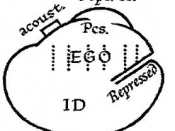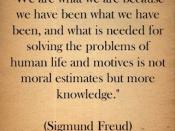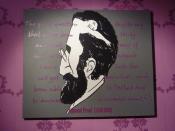Psychoanalytic ego psychology is distinguished by the priority that it assigns to the ego's management of instinct-derivatives. Ego psychology had its foundations in Freud's writings of the 1920s, but first became a distinctive approach to psychoanalysis in the 1930s. In Inhibitions, Symptoms, and Anxiety, Freud (1926a) listed ten manners by which the ego defends itself against dangerous thoughts: regression, reaction-formation, isolation, undoing, repression, introjection or identification, projection, turning against the self, reversal, and sublimation or displacement of instinctual aims. To this list of defenses, Anna Freud (1966) added identification with the aggressor (pp. 116-120). The list has since continued to grow.
For Freud, das Ich, "the I, " was a metaphor that signified the part of the mind with which a person consciously identifies. In a loose sense, it was Freud's way of discussing the self. More technically, however, he defined the ego as the part of the mind that performs rational thinking, the type of thought that he considered a "secondary process."
Freud's (1923a, 1940b) concept of the ego did not include the defense mechanisms that Anna Freud (1966) attributed to it. Freud (1926a) explained:Symptom-formationâ¦has two assets: one, hidden from view, brings about the alteration in the id in virtue of which the ego is removed from danger; the other, presented openly, shows what has been created in place of the instinctual process that has been affected-namely, the substitutive formation. It would, however, be more correct to ascribe to the defensive process what we have just said about symptom-formation and to use the latter term as synonymous with substitute-formation. (p. 145)In this formulation, defense consists of (1) unconscious stimulus barriers, such as repression, that enlarge the dynamic unconscious repressed and so remove the ego from danger, and (2) the substitution of a fantasy for the repressed that manifests the...


